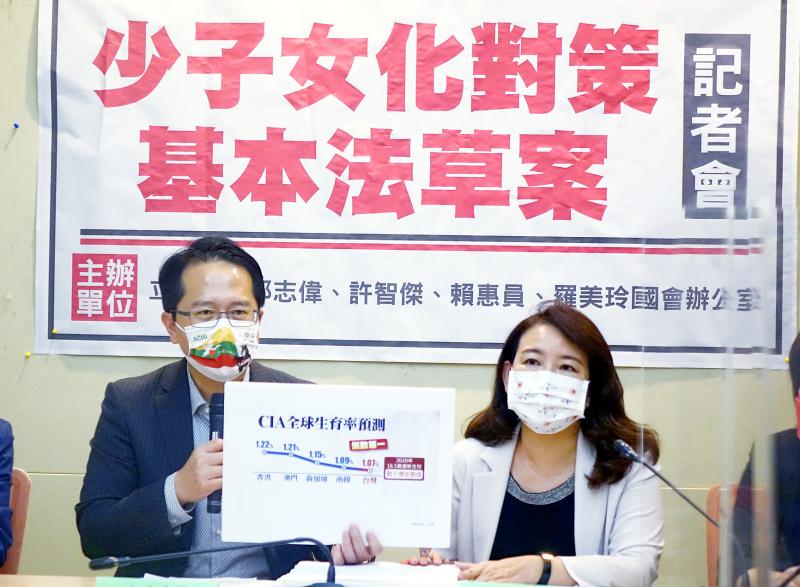Legislators yesterday proposed enacting a basic law to address the nation’s dwindling birthrate.
The proposed legislation would define the roles that the government, and business and civil groups would have in tackling the issue — an approach that its sponsors believe would give the matter needed legal specificity.
Democratic Progressive Party (DPP) Legislator Chiu Chih-wei (邱志偉), who proposed the bill, along with sponsors and fellow DPP legislators Hsu Chih-chieh (許智傑), Lai Hui-yuan (賴惠員) and Loh Meei-ling (羅美玲), announced the bill at a news conference at the Legislative Yuan in Taipei.

Photo: Wang Yi-sung, Taipei Times
Taiwan last year registered a decline in population for the first time, and in the first half of this year recorded 6.46 percent fewer births than in the same period last year, Lai said.
Considering next year is the inauspicious Year of the Tiger, Lai said that the birthrate would likely fall even lower, necessitating legislative action as soon as possible.
The bill is a direct result of a public hearing held by Chiu in February to ascertain from experts and officials the reasons behind the nation’s population woes and potential solutions.
The main takeaways were suggestions to set up a Cabinet-level task force and pass dedicated legislation to address the problem, Chiu said.
The government currently tasks individual agencies with setting their own policy, a strategy that lacks coordination as well as oversight, he said.
There is no standard for evaluating performance, nor is the legal system effectively utilized, he said.
Based on Japan’s 2003 Basic Act for Measures to Cope With Society With Declining Birthrate, the bill aims to clearly define the rights and responsibilities of various groups, including different levels of government, and business and civil organizations, Chiu said.
The Japanese law has helped boost that nation’s birthrate, but a lack of coordination in Taiwan has stymied the efforts of individual agencies, Loh said.
According to the draft, the Executive Yuan would be required to coordinate different agencies, as well as give an annual report to the legislature on results, while holding local governments accountable for implementing policies.
The policies called for in the bill include a sound public and quasi-public childcare environment, subsidies for fertility treatments and measures to reduce the financial burden of child rearing, such as childcare subsidies, and healthcare, preferential housing and tax incentives.
The bill would also provide a legal basis for agencies to budget for related policy.
Childcare is the most pressing issue facing parents today, Hsu said.
Even though the number of quasi-public preschools is on the rise, they still only account for less than 60 percent of all preschools nationwide, he said.
Population policy must start in the public sector, Hsu added.

POSITIVE DEVELOPMENT: Japan and the US are expected to hold in-depth discussions on Taiwan-related issues during the meeting next month, Japanese sources said The holding of a Japan-US leaders’ meeting ahead of US President Donald Trump’s visit to China is positive news for Taiwan, former Japan-Taiwan Exchange Association representative Hiroyasu Izumi said yesterday. After the Liberal Democratic Party’s landslide victory in Japan’s House of Representatives election, Japanese Prime Minister Sanae Takaichi is scheduled to visit the US next month, where she is to meet with Trump ahead of the US president’s planned visit to China from March 31 to April 2 for a meeting with Chinese President Xi Jinping (習近平). Japan and the US are expected to hold in-depth discussions on Taiwan-related issues during the

‘LIKE-MINDED PARTNER’: Tako van Popta said it would be inappropriate to delay signing the deal with Taiwan because of China, adding he would promote the issue Canadian senators have stressed Taiwan’s importance for international trade and expressed enthusiasm for ensuring the Taiwan-Canada trade cooperation framework agreement is implemented this year. Representative to Canada Harry Tseng (曾厚仁) in an interview with the Central News Agency (CNA) said he was increasingly uneasy about Ottawa’s delays in signing the agreement, especially as Ottawa has warmed toward Beijing. There are “no negotiations left. Not only [is it] initialed, we have three versions of the text ready: English, French and Mandarin,” Tseng said. “That tells you how close we are to the final signature.” Tseng said that he hoped Canadian Prime Minister Mark Carney

President William Lai (賴清德) yesterday bestowed one of Taiwan’s highest honors on Saint Vincent and the Grenadines (SVG) Ambassador Andrea Clare Bowman in recognition of her contributions to bilateral ties. “By conferring the Order of Brilliant Star with Grand Cordon on Ambassador Bowman today, I want to sincerely thank her, on behalf of the Taiwanese people, for her outstanding contribution to deepening diplomatic ties between Taiwan and SVG,” Lai said at a ceremony held at the Presidential Office in Taipei. He noted that Bowman became SVG’s first ambassador to Taiwan in 2019 and

A man walks past elementary school artworks at the Taipei Lantern Festival in Ximen District yesterday, the first day of the event. The festival is to run from 5pm to 10pm through March 15.